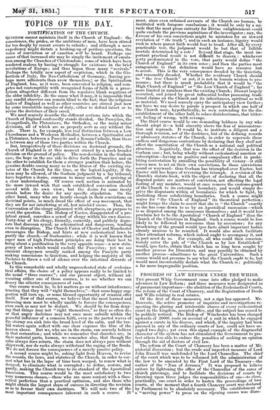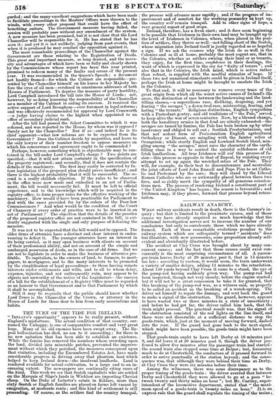PROGRESS OF LAW REFORM UNDER THE WHIGS. THE present Whig
Government came into office pledged to make advances in Law Reform ; and three measures were designated as of paramount importance—the abolition of the Ecclesiastical Courts, the reform of the Court of Chancery, and the Registration of Deeds and Wills relating to real estates.
Of the first of these measures, not a sign has appeared. Mr. Bouverie, the active promoter of inquiries and investigations re- specting the glaring and intolerable abuses of every ecclesiastical court in the kingdom, accepted office, and the subject has ceased to be publicly noticed. The Bishop of Winchester has been charged upwards of 20001. costs on account of a suit in which he engaged against a curate in his diocese, and which, if the inquiry had been pursued in any of the ordinary courts of law, could not have oc- cupied two days ; yet even this signal example of the disgraceful character of the system has not stimulated the Government to pro- tect others less able to endure the penalties of seeking an opinion through the aid of doctors of civil law. The reform of the Court of Chancery has been a matter of Mi- nisterial discussion ; but the crude and imperfect measure of Lord John Russell was undefended by the Lord Chancellor. The chief of the court which was to be reformed left the administration of the law to be amended by the First Lord of the Treasury—the author of the " Nun of Arrouca." It was proposed to relieve suitors by lightening the office of the Chancellor of the cares of church patronage, and to facilitate the decisions of courts by throwing upon three judges the responsibilities of one—to close, practically, one court in order to hasten the proceedings of two courts, at the moment that a fourth Chancery court was declared by Parliament to be absolutely necessary. The establishment of a "moving power" to press on the ripening causes was disre- garded ; and the many excellent suggestions which have been made to facilitate proceedings in the Masters' Offices were thrown to the winds, with every other proposal that could have the effect of benefiting suitors. The Government measure having failed, the session will probably pass without any amendment of the system. A- new measure has been promised, but it is not clear that the Lord Chancellor will be responsible for it. He has stated that he has seen it; and yet it is not unlikely, judging from past events, that when it is produced he may oonduet the opposition against it. The more remarkable proceedings of the Chancellor against the Government are those /elating to the Registration of Deeds. This great and important measure, so long desired, and the neces- sity and advantages of which have been so fully and clearly shown by the Commissioners whose report has been this year printed, promised to redeem many of the faults and errors of the present year. It was recommended in the Queen's Speech ; a document not hastily fnuned—for which the Cabinet are responsible—pre- sented by the Chancellor himself on his knees to her Majesty be- fore the eyes of all men—reechoed in unanimous addresses of both Houses of Parliament. To deprive the measure of party hostility, Lard Campbell introduced the bill into the House of Lords ; not, however, by so doing lessening the responsibility of the Chancellor awe member of the Cabinet in aiding its success. It received the active support of Lord Brougham—ever foremost in legal reforms ; and was effectively recommended for approval by Lord Cranworth --a judge having claims to the highest when appointed to an office of secondary judicial rank. After the bill had passed the Select Committee to which it was refhrred, and was reported to the House, by whom was it opposed ? Surely not by the Chancellor? But if so—and indeed he is its chief opponent—what law reforms are to be expected from the Government Does the Cabinet decide by majorities, and leave to the only lawyer of their number freedom to oppose measures on which his concurrence and agreement ought to be commanded ?
Perhaps, however, something which is objectionable may be con- tained in the bill under Lord Campbell's charge ? Two points are ified,—that it will not attain certainty in the specification of e property registered ; and secondly, that it does not contain the details of the machinery. The first may easily be corrected by fu- ture legislation if the proposed plan should prove insufficient ; and there is the highest probability that it will be successful. The se- card is a really childish objection. If the rules to be observed in the office were now made and embodied in an act of Parlia- ment, the bill would necessarily fail. It must be left to official experience, and to the knowledge which will be acquired in the registry-office, to form proper rules for the effective working of the machinery. How would it have been practicable for Parliament to deal with the cases provided for by the orders of the Poor-law
Commissioners 7 And what would be the condition of the Court
of Chancery if every order of practice were to be inserted in an act of Parliament ? The objection that the details of the practice of the proposed registry-office are not contained in the bill, is evi- dently suggested with the single and only purpose of defeating the measure.
It was not to be expected that the bill would not be opposed. The older firms of attornies have a distinct and clear interest in endea-
vouring to defeat it. The younger attornies have an interest in its being carried, as it may open business with clients on account of their professional ability, and not on account of the simple and 1 uncharged possession of deeds, as in the case of old- firms, But we are not to legislate in order to make the business of attornies pro- '
fitable. To capitalists, to the owners of land, to farmers, to mort- gagors, to mortgagees, and to• the many' interests to be promoted by the simplification of legal proceedings—to those having remote
interests under settlements and wills) and to-all to whom delay, expense, injustice, and not unfrequently ruin, may appear to be objects not unworthy of the notice of the Legislature—the success of a bill for the establishment of a Registry Office must be regarded as an. honour to that Government and to that Parliament by which it shall be accomplished.
Still it may be requisite that the public should know whether Lord Truro is the Ohanrellor of the Crown, or attorney in the House of Lords for those dear to him. from- early associations and habits.



























 Previous page
Previous page